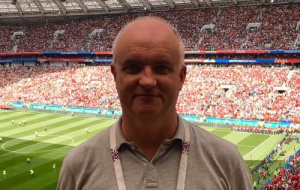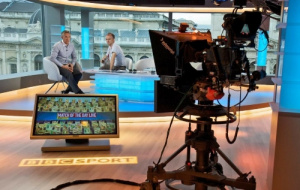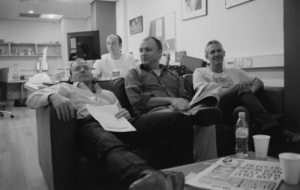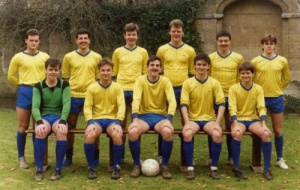Profile: Paul Armstrong

Paul Armstrong (1984, PPE)
After spending much of his career running BBC TV’s Match of the Day Paul Armstrong (1984, PPE) wrote the memoir Why Are We Always On Last?. During the first lockdown, he wrote Why Are We Always Indoors?, which was published in August.
How did you change from the moment you walked through Univ’s doors to your graduation?
As a state school product, originally from the North East, Oxford was never really on my radar, until I surprised myself with my A-Level grades and was persuaded by my politics teachers to give it a go as a 7th term applicant. I knew absolutely nothing about any of the colleges but liked the sound of the write-up in the Oxford alternative prospectus – homely, good social mix, three football teams, best beer cellar in Oxford – so I applied to read PPE at Univ.
The first time I walked through Univ’s doors, I turned up at the interview extremely relaxed, having already been offered a place to read Economics at Manchester. Even as an 18 year-old philistine, the architecture and intimacy of Univ leapt out – I enjoyed the interview with a down-to-earth but challenging bunch of dons in (I think) David Soskice, Iain McLean and David Wiggins. I also liked the other applicants I met: Alex Kershaw (1994, PPE) and Rebecca Ford (1984, Classics) being two who, like me, eventually made the cut.
As for my time as an undergraduate, after the initial settling-in period where I mostly clung to fellow beery footballers, I made lifelong friends from all kinds of backgrounds and learnt to judge everyone on their merits, not an upbringing over which, like me, they had no control, or indeed views they held which I might not share. I learnt how to argue cheerfully with seemingly more confident individuals in the latter category long into the night. And as we all got to know each other better, I realised that their confidence was as much of a veneer as my Northern chippiness. Univ always had something of a family atmosphere and even in those days, when the famed (and often ludicrous) British stiff upper lip was still partially in evidence, support networks sprang up and we muddled our way through and evolved together.
Academically, I relaxed considerably after Prelims, and dropped Economics – the one somewhat mathematical element of the holy trinity which I’d thought I might fail – and really enjoyed the second and third years, getting the mix of socialising, playing football, and delivering acceptable essays somewhere near right.
And I was around some remarkable people: Christina Lamb (1983, PPE), the brilliant Sunday Times Foreign Correspondent; and (now) Professor Anand Menon (1984, History and Modern Languages), the renowned EU politics guru, were in my year. In other years, the great comic writer Armando Iannucci (1982, English) emerged occasionally from the library to perform stunning end-of-term reviews, and amongst my fellow PPEists, the now Sunday Times editor Emma Tucker (1986, PPE) seemed like a media star in the making. ITV, then the BBC’s, Nick Robinson (1983, PPE) and the now Baron Stewart Wood of Anfield (1986, PPE) were impressive political speakers and very quick on their feet. It’s probably the country’s loss that neither of them (nor anyone else in our Univ generation, as far as I know) stood as Parliamentary candidates, as most of us thought they would.
Most of all, I grew up at Univ. I would not have been equipped for the world of work and independence I subsequently entered when I first arrived. I largely was by the time I left, with a lifetime’s worth of friendships and memories.

On an MOTD set with Gary Lineker, Vienna Euro 2008.
How did you go from a politics degree to television?
Unlike many of my fellow PPEists – and indeed Oxford humanities graduates in general – over the years, I never thought for a second that my degree qualified me to try to run the country. Several PPE graduates in prominent governing roles are currently cementing my belief that I may have made the right call…
My auntie had been a journalist at the Northern Echo – she interviewed the Beatles at the Globe Theatre, Stockton-on-Tees on the day JFK was shot – so that was always a career choice which sounded more interesting than most, and which I felt I might like to try to emulate. The BBC had a graduate entry scheme to which I applied. As with my application to Univ, I was fairly relaxed about it, with a place already confirmed on an NCTU journalism training course. I’d edited the College magazine Univox, and always enjoyed writing, but had nowhere near the media credentials the average aspiring undergraduate can assemble now. The BBC were looking for a cross-section of graduates to train, who’d then work across all manner of programming as trainee producers. My love and knowledge of sport undoubtedly helped me to be noticed in a field of would-be documentary makers and Panorama producers. That said, I was open-minded about where I’d end up later while I was training, and I worked in regional news in my native North East and on the fledgling BBC Breakfast.
The pivotal moment for me came when I found myself working in the BBC Sport vans at the Hillsborough disaster. As that horrendous afternoon and evening unfolded, I had to produce a roving camera crew and send material back to base both from the ground and at subsequent police and ministerial media conferences. As the news professionals arrived from around the world, there was an unmissable, and rather detached, almost war-zone sense of “I’ve landed a big scoop here.” As a long-time habituee of the football terraces who happened to have been watching helplessly from the sidelines as catastrophe unfolded, I did a professional job, but hated every minute of it, and was very affected for some time afterwards. I knew there and then that the relatively unimportant world of sport was my natural home.
What was editing Match of the Day like?
If you’d said to the ten (or indeed twenty) year-old me that I’d spend the bulk of my professional career working at BBC Sport, I would have said it was my dream job. In many ways it was, although some of my fondest memories are of rising through the ranks, editing individual matches for MOTD, making features and end of tournament music montages, and travelling to events around the world.
Once I became the editor, with whom the buck stopped, the pressure mounted and, tongue only partially in cheek, I dubbed myself the “worrier-in-chief”. The job involved navigating a huge team through hundreds and hundreds of live programmes. Naturally, given how it’s funded, everyone feels they own a piece of all BBC shows, and the social media-amplified weekly furore over our (my) running order gave me the title of my memoir Why Are We Always on Last? (foreword by Gary Lineker). How ever fraught live TV became, both Gary and I shared the philosophy that football is “the most important of all the unimportant things in life” and tried to make programmes in that spirit.

MOTD production office, Paul sits between Alan Shearer and Gary Lineker.
Do you have a writing process?
The first book started with a couple of draft chapters to test the water. Once I had a publisher, I wrote to a fairly tight deadline in bursts. In some ways, my experience of essay crises at Univ helped with that, although strangely I’m better now at spacing out the workload and keeping to a manageable timetable than I ever was during my degree. The only time I’ve found myself up until 4am in the writing process was a few last-minute revisions the day before the book went to press. I’m afraid it was a twice-weekly occurrence during my degree, as anyone who ever attended morning tutorials with me will testify.
The second book was entirely different. Stuck in London lockdown in March having vaguely promised my publisher a follow-up on the travails of North East football, I began keeping a journal on the first Saturday on which Match of the Day had to be cancelled. With my interest in politics, this naturally expanded beyond the absence of football to some trenchant opinions on how the crisis was handled at a governmental level, but with added ramblings on my other great love, music, the books I was reading, the box sets we were watching, attracting birds to our suburban patio and all manner of other manifestations of Proust’s “the pleasure of small things.”
In terms of process, I would have absolutely astonished my undergraduate self with my discipline in writing solidly from after breakfast until lunchtime every day until MOTD returned in June. I sent my work out to a mailing list of old friends (including several from Univ) on a weekly basis – one of whom, the great comedy writer Dick Clement (of Clement and Le Frenais) collaborated on some comic anecdotes by email and kindly wrote the foreword. Why Are We Always Indoors? (Unless we’re off to Barnard Castle) was published in September 2020.
Have you faced any challenges in your life that you are happy to share here?
The most difficult professional challenge came from 2014 onwards when I was diagnosed with a condition called inner ear hydrops. This caused dizziness and some secondary anxiety, and worst of all left me with tinnitus and an impaired ability to pick out strands of conversation in a busy environment. This was clearly an issue in terms of live TV galleries, and in the end I had to accept my fate and took redundancy in 2016. I touched on that experience in my first book, and in the contemplative mode of lockdown I’ve expanded on it considerably in the second.
Given that it meant abandoning my “dream job” and the role which has identified me for so long, I’ve slightly surprised myself with how philosophical I’ve been about it. It’s something of a cliche, but I can generally take satisfaction from having done the job for so long, rather than dwell on the fact that I can no longer do it. I always felt that I was only ever the custodian of Match of the Day – a show which first transmitted the autumn I was born – and in my fifties, albeit slightly prematurely, the natural order of things was for my deputy to take over and continue the show’s slow evolutionary process. It helps that I have had fantastic support from my wife and family, and friends both at the BBC and back to school and Univ days.

Kershaw’s Killers. Paul is second from the right on the front row, next to moustachioed Captain Alex Kershaw (1984, PPE).
Do you have any favourite moments from your time at Univ?
Hmm. I’d best avoid stories which are either too cringeworthy to repeat or which incriminate me or others, but I’m afraid non-academic highlights spring to mind. I loved writing for and editing Univox. It was a sub Private Eye mix of gossip, silliness and occasionally pretentiousness from people who, in some cases, later made a living from writing. It gave me the freedom to try out what I hoped were funny lines, variants on which often made it into BBC Sport scripts, and now my books, over the years.
Another favourite memory was the first term of the second year. Having passed Prelims that summer, I finally felt comfortable in my skin academically (I was studying a couple of politics subjects which I’d already covered to an extent at A Level) and, after some typically fumbling and shambolic undergraduate romantic encounters in the first year, I was going out with someone from outside College.
Most of all, I was a key member of “Kershaw’s Killers”. This was the football team captained by the aforementioned Alex – now a much-published and respected war historian – which despite its ramshackle appearance, and less than disciplined approach, won every game that term. Never the most diligent of runners, I was free to play up front (three hat-tricks in the term) as Alex performed like a proto Vinny Jones in midfield, hinting at his future profession with cries of “They can run but they can’t hide.” Then current Irish international rugby star Brendan Mullen even joined me up front for one game the next Cuppers term, doing a passable Billy Whizz impression, only to take himself off at half-time with a muscle twinge. “Sorry, lads. Can’t take any chances. We’re playing France on Saturday,” was one of the better excuses I’ve ever heard.
Do you have any funny moments from your career that you’re happy to share?
I expand on these in the first book, but two spring to mind: a horrendous opening to a live FA Cup tie at Wolves in which, for some reason, Alan Hansen thought we were still rehearsing and carried on reading his notes and muttering “uh-huh” as Gary Lineker tried to engage him in conversation. As the editor, I was supposed to leave the instructions in a opening segment to the director, but when Gary suddenly doubted what was happening and asked directly to camera “Are we on the air?”, my blurted “Too f-ing right we are” went down in MOTD folklore.
The second tale, funny in retrospect, but which aged me a decade at the time – came at the FA Cup Final of 2006, arguably the best of the last three decades or so. Steven Gerrard scored with a 30 yard piledriver in injury time for Liverpool against West Ham to make the score 3-3 and take us into extra-time. A marvellous spectacle, with an ever-growing audience, or so we thought. It turned out a new series of Doctor Who was starting that evening, and the person in the BBC1 control room didn’t know anything about football and didn’t want us to stay on, first for extra-time, then penalties, then for the trophy being lifted. The phone dialogue between me and BBC1 is recorded at length in the first book. Too long to go into here, but my final (winning, thank goodness) argument was along the lines of “the Cup being lifted has featured live every year since it was first televised in 1938. I really wouldn’t take us off the air now, you’ll lose your job if you do.” Maybe arguing about anything and everything long into the night at Univ paid off in the end.
Describe Univ in 3 words.
Historic. Friendly. Formative.
Paul can be found @armoaning on Twitter.
Published: 9 November 2020
